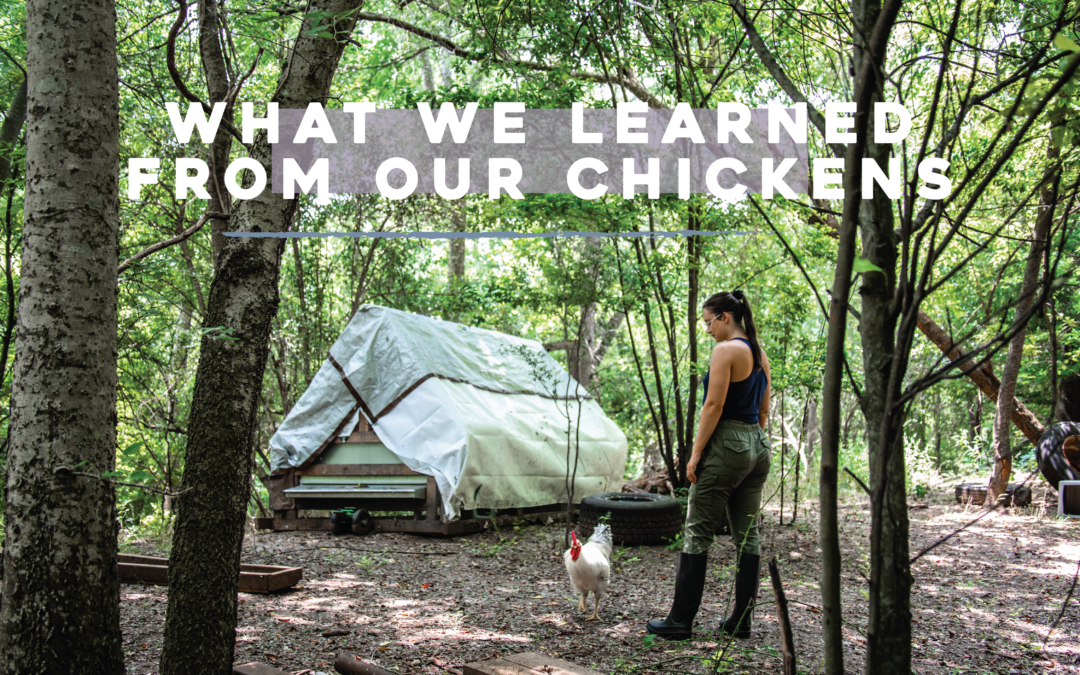What We Learned from our Chickens

Earlier this spring, we purchased a poultry farm together with my (Andrea’s) uncle. Unfortunately, our operation didn’t pan out quite as we hoped, and this past week, we sold our hens to a friend. We have had a wild time taking care of nearly 100 birds, and we learned a lot during our time on the poultry farm. While we are nowhere near poultry farming experts, we discovered what’s worked for us and what hasn’t, and more importantly, we know exactly what we would do next time around!
Here are the biggest things we learned while running our poultry farm.
1. Caring for livestock takes a ton of time.
It seems like everybody and their mother has backyard chickens, especially here in Bastrop. Given that fact, you might think that chickens are easy to care for and not too terribly time-intensive. At least that’s what I thought!
We had a bit of a unique situation, as we took over an already established poultry farm that needed quite a bit of cleaning up and improvement, and it was also a 20 minute drive for us to get to the farm. Plus we had a ton to learn, and ended up doing a few things the hard way! Even so, I found that I was spending anywhere from 15-20 hours a week on poultry: picking up feed, mixing feed, cleaning coops, collecting and boxing eggs, the daily care, and all the little unexpected things that came up in between. It was equivalent to a part-time job!
I’m sure having a dozen backyard chickens is a little easier than the 75 chickens, 10 heritage turkeys, and 2 ducks we took over, but there are a couple of truths about caring for birds no matter the size of your flock. The first of these is that the birds need to be visited every morning and evening. No matter how many birds you have or how much you decide to do in your visit, the birds need to be let out of their coop in the morning and put back into their coop in the evening (more on that later). Furthermore, they need fresh water and food, and the eggs need to be collected at least twice a day to make sure they don’t get stepped on, crushed, or eaten. Any way you slice it, caring for livestock is a big commitment that takes a ton of time!
2. Training is paramount.
I mentioned earlier that chickens need to be let out of their coop every morning and brought back to their coop every night. The way I understood it, chickens like to sleep in their coop and, given the choice, they will return to it because they see it as a safe place. Unfortunately, this is not how our chickens saw it.
When we purchased the farm, the previous owner let us know that she had stopped closing the coop doors at night because the electric fences were keeping the predators out on their own. That way, no one has to wake up at the crack of dawn to let out chickens before they get grumpy and start fighting. It made sense to us (if the coops are for predator control but the fence is already keeping out the predators, what’s the issue?) so we rolled with it.
I’m not sure when exactly it started, but somewhere between not locking them in the coops and moving the coops and pens around in a rotational grazing format, these birds stopped sleeping in the coops altogether. We never were able to train them to go back into their coops at night, even though the previous owner said that’s where they used to sleep without fail. It seems that if there’s a certain behavior you want out of your birds, it’s really easy to lose that training and exponentially difficult to get it back.
3. Predators are relentless.
Now we come to the saddest lesson we learned with our birds. Even with the heavy workload and unruly birds, we were getting along just fine until the predator attacks started. We had visits from just about every predator you could think of, and the scenes were often gruesome and heartbreaking. We found decapitated chickens from owl attacks, birds mauled by raccoons, piles of feathers left behind from hawk attacks, and rather mysterious disappearances from still unknown predators (maybe coyotes?). We tried everything we could think of or research, from traps for the raccoons to netting and decoys for the owls and hawks. Somehow nothing made a real difference on the safety of our flock. The tough irony is that the only thing that could have possibly saved the birds was to be locked safely in their coops at night, but nothing we tried would convince them to go back there in the evenings.
After a heart wrenching week of trying different tactics, we decided our only option left was to catch our remaining chickens one by one and lock them up in a coop. They were definitely unhappy at being confined after a rather free few months, but at least they stayed safe until we found them a new home. We recognize the responsibility we took on when we bought this poultry farm, and it’s sometimes difficult not to blame ourselves for all the birds we lost. But nature is messy, chaotic, and often cruel, and trying to control it is incredibly difficult, if not impossible.
In many ways, our time with our poultry farm brought us some of the most difficult challenges we’ve faced. Caring for livestock comes with immense responsibility, an astounding amount of chaos, and a laundry list of seemingly impossible tasks. Farming truly is holding the power of life and death in your hand, and quite often it seems like the animals are intent on trending toward the wrong end of that spectrum. Just keeping animals alive can feel daunting and insurmountable, much less keeping them happy and healthy. But eating the eggs that we cultivated or seeing our birds enjoy the world we’d built for them brought us a remarkable feeling of pride and accomplishment. Plus, I think chickens are just some of the best, most fun creatures out there. Caring for livestock is such a uniquely human experience, and I for one am looking forward to another time in my life where I can do it again. Next time with fewer birds, and somewhere I can keep a closer eye on them!


Tyler & Andrea
If there’s one thing we know in the Hixson household, it’s that we want our lives to be wild, free, and lived intentionally. With that as our motto, it makes sense that our resume is pretty eclectic; we’ve started and successfully run our own marketing company, we’ve lived in an RV and traveled the country, we’ve created documentaries, hosted podcasts, learned to hunt and fight, and most recently helped build a no gi jiu jitsu gym in our new home of Bastrop, Texas.
We love doing things ourselves and finding self-sufficiency and independence in unexpected places. From the food we cook all the way up to the businesses we run, we put a lot of thought into everything we do (probably too much thought!) and we feel strongly that that’s what makes our life extraordinary.
CONTACT US
OR, Get Updates
We'll shoot you a message when we release big projects



